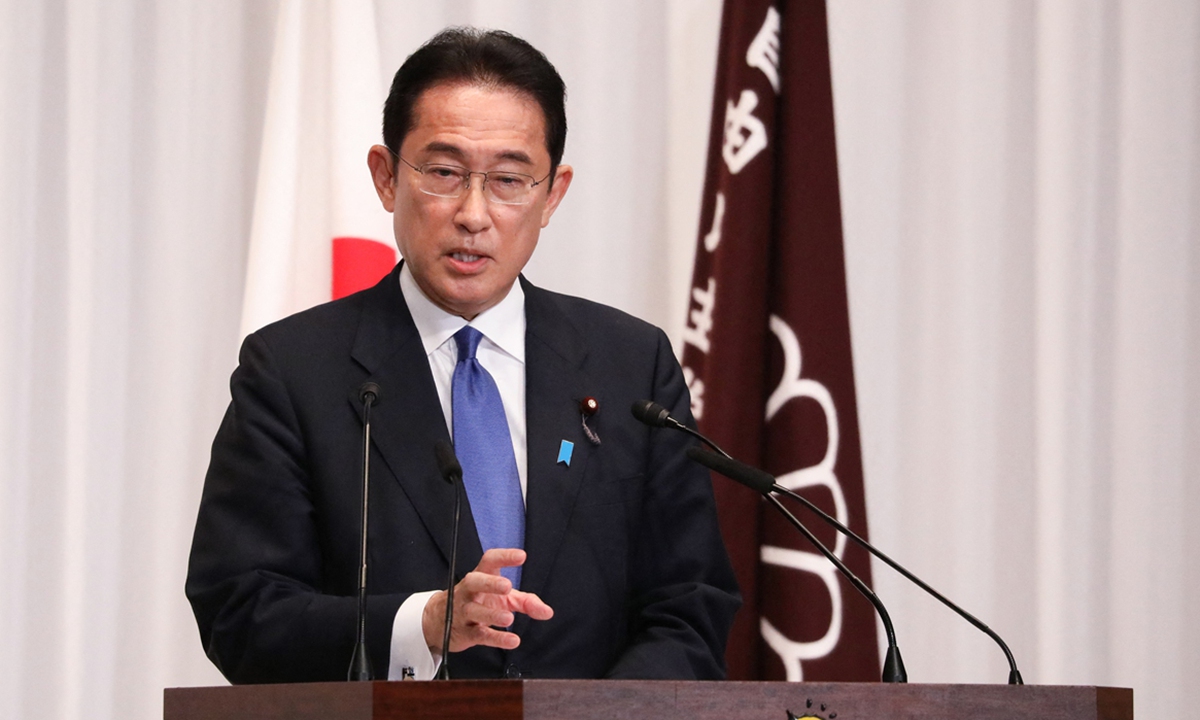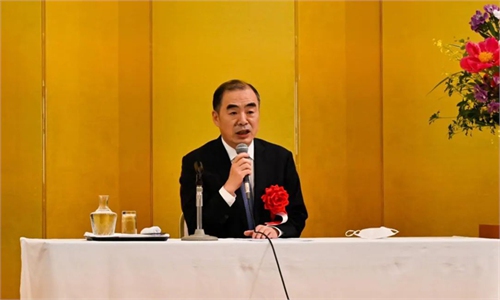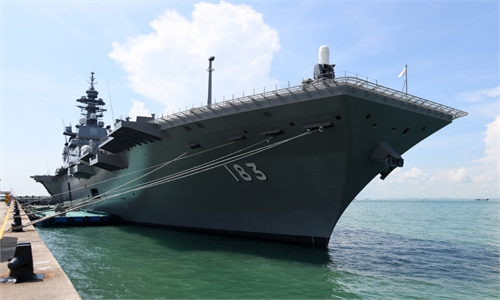Japan nibbles at one-China principle with ‘dangerous’ plan to send active-duty military staff to Taiwan, consequences far beyond ‘ties deterioration’

Japanese Prime Minister Fumio Kishida Photo:AFP
China needs to be alert to Japan's escalation of substantive engagement with Taiwan secessionist authorities and the possibility of the island becoming a new intelligence stronghold against the Chinese mainland, Chinese experts said on Sunday, following Japanese media's reports that Japan has decided to send active-duty military staff to the island of Taiwan for the first time.
According to an exclusive report released by Japan's right-wing Sankei News on Saturday, the Japanese government has decided to dispatch a staff member from Japan's Ministry of Defense to work at the so-called Japan-Taiwan Exchange Association's Taipei office as early as this summer.
Media reported that Japan's Taipei-based office has only one former defense officer who retired at the rank of major general. By sending an active-duty official, Tokyo aims to boost its intelligence gathering amid the growing tensions in the Taiwan Straits.
2022 marks the 50th anniversary of the normalization of diplomatic relations between China and Japan. Although Japanese media said regarding the impact on China-Japan ties, the planned dispatch is a civilian official from the ministry of defense rather than a military officer, Chinese experts said Japan's move is still "dangerous" by nibbling at one-China principle.
The potential posting of an official to Taiwan is a manifestation of Japan's policy shift, and the Chinese mainland should remain on high alert, Da Zhigang, director of the Institute of Northeast Asian Studies at Heilongjiang Provincial Academy of Social Sciences, told the Global Times on Sunday.
Da said that depending on the effect of the possible posting, Japan may pave the way for further actions in the future: the next step may be to send active military personnel or even an officer team of the Japan Self-Defense Force as well as senior officials from the Japanese security authorities "to make official exchanges an established fact."
Over the past two years, Japan's substantive moves on the Taiwan question have gradually escalated. In April 2021, the Taiwan question was mentioned in the joint statement of Japan-US summit for the first time in 52 years. In June 2021, former Japanese prime minister Yoshihide Suga falsely referred to the island of Taiwan as a "country."
In July 2021, Japan for the first time referred to the importance of the stability of the Taiwan Straits in its annual defense report. The similar reference on Taiwan appeared in Japan's diplomatic blue book of 2022 as well. Former Japanese prime minister Shinzo Abe even remarked that "any emergency over Taiwan would mean an emergency for Tokyo."
By sending an official to strengthen intelligence-gathering, Japan could further set up a quasi-official organization or association in Taiwan along with US and Taiwan secessionists to spy on the Chinese mainland and work to destabilize or even attempt to subvert the body of central power of the People's Republic of China, a Beijing-based Taiwan-born observer told the Global Times in condition of anonymity.
"With the situation in Hong Kong stabilized, Taiwan is probably the last base dominated by Chinese community that could serve as an intelligence base against the mainland," the observer noted.
Yet Japan's ambitions go far beyond that. Japanese media reported on Saturday that Prime Minister Fumio Kishida is planning to attend the NATO summit in June, where the Taiwan Straits tension is highly likely to be a topic.
"The reason why Japan disclosed it is sending an official to Taiwan before the NATO summit is that they believe that after the summit, tension in the Asia-Pacific region will escalate," a Beijing-based expert told the Global Times on Sunday. He noted that Japan wants to make early arrangements and try to pull the US and Western allies as well as Taiwan secessionists along the direction set by Japan.
He warned that collusion between Taiwan secessionists and Japan would continue to intensify, given that the Japanese right wing is still nostalgic for its half-century colonization of the island of Taiwan. Realistically, Japan also needs the island as a card to contain the Chinese mainland.
Relations between Japan and Russia have deteriorated due to the Ukraine crisis this year, but Japan should be aware that once it crosses the red line over the Taiwan question, China's internal affairs and core interests, Tokyo cannot expect the consequences to be as simple as a "deterioration of relations," as the two sides may well become belligerent rivals, the expert said.
No one can stand in the way of China's reunification process, and no one had better underestimate the determination of the Chinese people to safeguard sovereignty and territorial integrity, the expert said.



